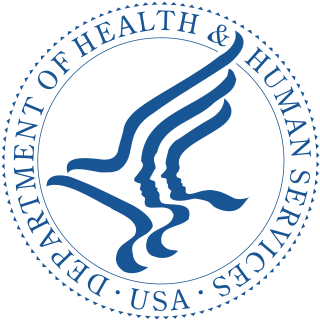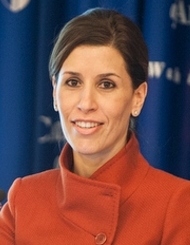Related Research Articles
Biosecurity refers to measures aimed at preventing the introduction and/or spread of harmful organisms intentionally or unintentionally outside their native range and/or within new environments. In agriculture, these measures are aimed at protecting food crops and livestock from pests, invasive species, and other organisms not conducive to the welfare of the human population. The term includes biological threats to people, including those from pandemic diseases and bioterrorism. The definition has sometimes been broadened to embrace other concepts, and it is used for different purposes in different contexts.

The United States Department of Health and Human Services (HHS) is a cabinet-level executive branch department of the U.S. federal government created to protect the health of the U.S. people and providing essential human services. Its motto is "Improving the health, safety, and well-being of America". Before the separate federal Department of Education was created in 1979, it was called the Department of Health, Education, and Welfare (HEW).

The Presidential Advisory Council on HIV/AIDS (PACHA) advises the White House and the Secretary of Health and Human Services on the US government's response to the AIDS epidemic. The commission was formed by President Bill Clinton in 1995 and each president since has renewed the council's charter.
Stewart Simonson is the Assistant Director-General of the World Health Organization responsible for the WHO Office at the United Nations and the WHO-US Liaison Office. He also serves as the Director-General's Special Representative for UN Reform. Prior to his assignment in New York, Simonson was the Assistant Director-General for the General Management Group at WHO headquarters in Geneva, Switzerland.

Michael Thomas Osterholm is an American epidemiologist, Regents Professor at the University of Minnesota School of Public Health, and director of the Center for Infectious Disease Research and Policy at the University of Minnesota.
Under United States law, Biological select agents or toxins (BSATs)—or simply select agents for short—are bio-agents which have been declared by the U.S. Department of Health and Human Services (HHS) or by the U.S. Department of Agriculture (USDA) to have the "potential to pose a severe threat to public health and safety". The agents are divided into (1) HHS select agents and toxins affecting humans; (2) USDA select agents and toxins affecting agriculture; and (3) overlap select agents and toxins affecting both.

One use of the concept of biocontainment is related to laboratory biosafety and pertains to microbiology laboratories in which the physical containment of pathogenic organisms or agents is required, usually by isolation in environmentally and biologically secure cabinets or rooms, to prevent accidental infection of workers or release into the surrounding community during scientific research.

The President's Council of Advisors on Science and Technology (PCAST) is a council, chartered in each administration with a broad mandate to advise the president of the United States on science and technology. The current PCAST was established by Executive Order 13226 on September 30, 2001, by George W. Bush, was re-chartered by Barack Obama's April 21, 2010, Executive Order 13539, by Donald Trump's October 22, 2019, Executive Order 13895, and by Joe Biden's February 1, 2021, Executive Order 14007.
The Public Interest Declassification Board (PIDB) is an advisory committee established by the United States Congress with the official mandate of promoting the fullest possible public access to a thorough, accurate, and reliable documentary record of significant U.S. national security decisions and activities. The Board is composed of nine individuals: five appointed by the President of the United States and one each appointed by the Speaker of the House, House Minority Leader, Senate Majority Leader, and Senate Minority Leader. Appointees must be U.S. citizens preeminent in the fields of history, national security, foreign policy, intelligence policy, social science, law, or archives.

The Administration for Strategic Preparedness and Response (ASPR) is an operating agency of the U.S. Public Health Service within the Department of Health and Human Services that focuses preventing, preparing for, and responding to the adverse health effects of public health emergencies and disasters. Its functions include preparedness planning and response; building federal emergency medical operational capabilities; countermeasures research, advance development, and procurement; and grants to strengthen the capabilities of hospitals and health care systems in public health emergencies and medical disasters. The office provides federal support, including medical professionals through ASPR’s National Disaster Medical System, to augment state and local capabilities during an emergency or disaster.

On December 19, 2006, the Pandemic and All-Hazards Preparedness Act (PAHPA), Public Law No. 109-417, was signed into law by President George W. Bush. First introduced in the House by Rep. Mike Rogers (R-MI) and Rep. Anna Eshoo (D-CA), PAHPA had broad implications for the United States Department of Health and Human Services's (HHS) preparedness and response activities. Among other things, the act amended the Public Health Service Act to establish within the department a new Assistant Secretary for Preparedness and Response (ASPR); provided new authorities for a number of programs, including the advanced development and acquisitions of medical countermeasures; and called for the establishment of a quadrennial National Health Security Strategy.
Lana Skirboll is the former director of the National Institutes of Health Office of Science Policy.
Biosecurity in the United States is governed by the Bureau of Western Hemisphere Affairs, which is part of the US Department of State. It obtains guidance and advice on specific matters relating to biosecurity from various other government agencies.

Brett P. Giroir is an American pediatrician. He was formerly the U.S. assistant secretary for health, a four-star admiral in the U.S. Public Health Service Commissioned Corps and an acting Food and Drug Administration commissioner.

Luciana Borio is a Brazilian-American infectious disease physician and public health administrator. She is a vice president at In-Q-Tel. She previously served as director for Medical and Biodefense Preparedness at the National Security Council, acting chief scientist of the U.S. Food and Drug Administration (FDA), assistant commissioner for counterterrorism policy of the FDA, and director of FDA's Office of Counterterrorism and Emerging Threats. She is known for her work advancing clinical trials, the development of medical countermeasures for health emergencies, and the public health responses to Ebola and Zika outbreaks.
NIH Office of Science Policy is the primary advisor to the Director of the NIH on matters of biomedical research policy issues that are of significance to the agency, the research community, and the public. The office also works with stakeholders within and outside of NIH to develop policies that promote progress in the life sciences. The current Acting NIH Associate Director for Science Policy and Acting Director of the NIH Office of Science Policy is Lyric Jorgenson, Ph.D.

Vickie Sutton is a Lumbee Law professor currently on the faculty of Texas Tech University. Since 2014, Sutton has been on the Texas Task Force on Infectious Disease Preparedness and Response.
Gain-of-function research is medical research that genetically alters an organism in a way that may enhance the biological functions of gene products. This may include an altered pathogenesis, transmissibility, or host range, i.e., the types of hosts that a microorganism can infect. This research is intended to reveal targets to better predict emerging infectious diseases and to develop vaccines and therapeutics. For example, influenza B can infect only humans and harbor seals. Introducing a mutation that would allow influenza B to infect rabbits in a controlled laboratory situation would be considered a gain-of-function experiment, as the virus did not previously have that function. That type of experiment could then help reveal which parts of the virus's genome correspond to the species that it can infect, enabling the creation of antiviral medicines which block this function.
References
- ↑ "National Science Advisory Board for Biosecurity (NSABB)". Office of Science Policy. Retrieved 2022-02-16.
- ↑ "National Science Advisory Board for Biosecurity (NSABB)". National Institutes of Health. Office of Science Policy. Retrieved 4 February 2021.
- ↑ "Recommended Policy Guidance for Departmental Development of Review Mechanisms for Potential Pandemic Pathogen Care and Oversight (P3CO)" (PDF). Department of Health and Human Services. Office of the Assistant Secretary for Preparedness and Response. 9 January 2017.
- ↑ "RECOMMENDATIONS FOR THE EVALUATION AND OVERSIGHT OF PROPOSED GAIN-OF-FUNCTION RESEARCH" (PDF). United States Department of Health and Human Services. National Science Advisory Board for Biosecurity. May 2016. Archived from the original (PDF) on 7 January 2017.
- ↑ "Reports and Recommendations of the National Science Advisory Board for Biosecurity (NSABB)". United States Department of Health and Human Services. National Science Advisory Board for Biosecurity. Retrieved 4 February 2021.
- ↑ "NSABB Member Roster" . Retrieved 2021-05-26.
- ↑ "Archived copy" (PDF). Archived from the original (PDF) on 2016-12-31. Retrieved 2017-03-22.
{{cite web}}: CS1 maint: archived copy as title (link)